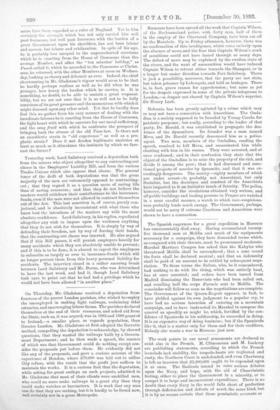On Thursday, Mr. Gladstone received a deputation from fourteen of
the poorer London parishes, who wished to employ the unemployed in making light railways, reclaiming tidal estuaries, and encouraging labour farms. The parishes declared themselves at the end of their resources, and asked aid from the State, such as, it was argued, was in 1883 and 1889 granted to Ireland,—a smaller place, as regards population, than Greater London. Mr. Gladstone at first adopted the Socratic method, compelling the deputation to acknowledge, by shrewd questions, that they wanted the railways built by a Govern- ment Department; and he then made a speech, the essence of which was that Government could do nothing except con- sider the proposals put before them. He evidently did not like any of the proposals, and gave a curious account of the experience of Hendon, where 270,000 was laid out to utilise City refuse, with the result that the profit just suffices to maintain the works. It is a curious fact that the deputation, while asking for great outlays on such projects, admitted to Mr. Gladstone that most of their clients were unskilled men, who could no more make railways in a great city than they could make watches or barometers. It is work that any man can do that they are seeking, but it is hardly to be found now, and certainly not in a great Metropolis.


































 Previous page
Previous page